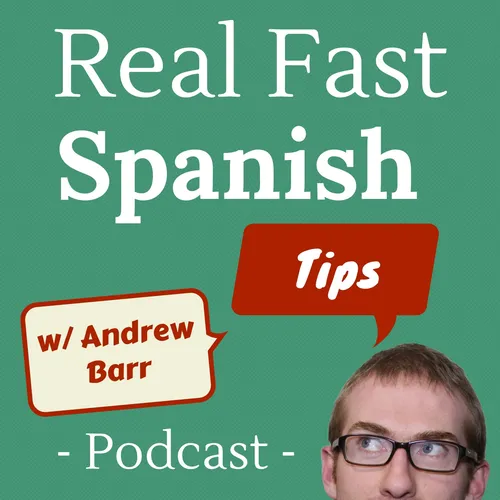Tips 013: 5 Useful Spanish Reflexive Verbs For Conversation
- Author
- Andrew Barr: Spanish Student, Teacher & Blogger
- Published
- Thu 10 Jul 2014
- Episode Link
- https://www.realfastspanish.com/podcast/5-useful-spanish-reflexive-verbs
Reflexive verbs can cause confusion amongst Spanish students. But they don’t have to.
As a follow up to the previous podcast episodes on Spanish verbs, this episode presents the reflexive form of Spanish verbs. In order to get a good understanding of reflexive verbs, we need to start back a the most basic sentence structure. Have a listen to today’s podcast to see how you can start to use these types of verbs in your Spanish conversations.
In tip number 7, I broke the types of Spanish verbs down into two groups of three.
Group 1:
- Ar verbs
- Er verbs
- Ir verbs
Group 2:
- Normal verbs
- Verbs like Gustar (discussed in tip number 7)
- Reflexive verbs (in today’s tip)
Reflexive verbs are formed when the subject and object of a sentence are the same thing. They could apply whether the subject is a person, place or thing. What you need to know to form reflexive verbs is a different form of Spanish pronoun.
The Spanish pronouns for reflexive verbs are called object pronouns and are as follows:
- Me – Me
- Te –You
- Se – Him / Her
- Nos – Us
- Os – You-all
- Se – Them
As you can see, these are very similar to the indirect object pronouns discussed in the earlier episode for use with verbs like gustar.
One thing to note with Spanish verbs, in general, is that the majority of verbs can be used in both a normal or reflexive form. But it is not worth getting hung up on lots of different verb forms, for conversation hacking, it is worth knowing the high use reflexive verbs first. So become familiar with the verbs discussed in today’s episode before you start to worry about the thousand of reflexive verb possibilities.
Verbs discussed in the episode:
- Llamarse – To call oneself
- Irse – To go away / to leave
- Acordarse – To remember
- Levantarse – To get out of bed
- Quejarse – To complain
Examples from the episode:
I speak with you – Yo hablo contigo
I’m hungry – Yo tengo hambre
I like the tapas – Me gustan las tapas
My name is (I call myself) – Me llamo Andrew
How do you call yourself – ¿Cómo te llamas?
I call you over Skype – Te llamo por Skype
I go to the market – Voy al mercado
I have to … = Tengo que …
I have to leave = Tengo que irme
You have to go = Tienes que irte
I have to go to the market = Tengo que ir al mercado
We agree to speak in private = Acordamos hablar en privado
I agree = Estoy de acuerdo
I don’t remember = No me acuerdo
I lift something from the table = Levanto algo de la mesa
I get myself out of bed = Me levanto de la cama
I don’t want to complain = No quiero quejarme
My friend complains a lot = Mi amigo se queja mucho
It’s better not to complain = Es mejor no quejarse
Quote from the podcast episode:
“Los que se quejan de la forma como rebota la pelota, son aquellos que no la saben golpear.” – José Ingenieros (1877-1925)
Additional Bonus Examples For Extra Practice:
What are they called? – ¿Cómo se llaman?
I leave the house (I am away from home) – Me voy de la casa
I get out of bed at 7 am – Me levanto de la cama a las siete
When are you going to get out of bed? – ¿Cuándo se levanta de la cama?
Why do you complain? – ¿Por qué te quejas?
Do you remember when we have to leave? – ¿Te acuerdas cuando nos tenemos que ir?
Verbs that are reflexive end in “se” in the conversation hacking guide you can see the verbs mentioned in this episode with the (se) in brackets and the alternative meaning in English also highlighted in brackets.
How else can you use these reflexive verbs?
The post Tips 013: 5 Useful Spanish Reflexive Verbs For Conversation appeared first on Real Fast Spanish.
